高中英语 外研版(2019)选择性必修二 Unit 6 Survival Using language 课件(共30张,内嵌音频)
文档属性
| 名称 | 高中英语 外研版(2019)选择性必修二 Unit 6 Survival Using language 课件(共30张,内嵌音频) | 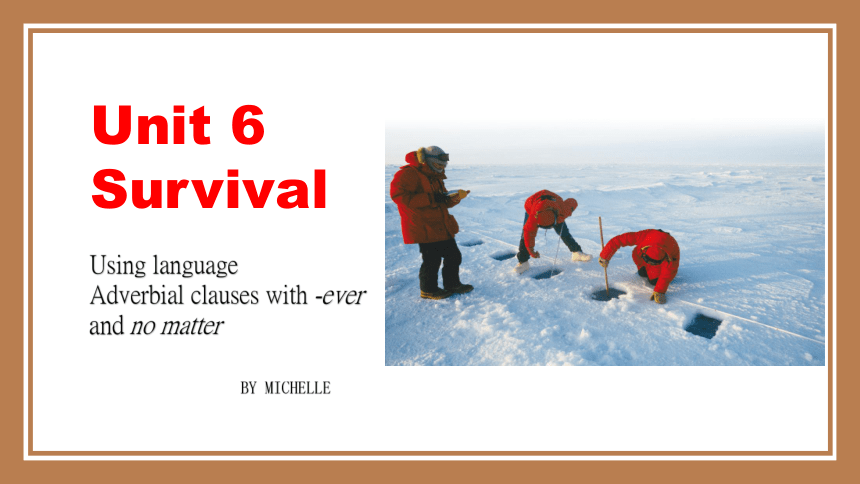 | |
| 格式 | pptx | ||
| 文件大小 | 9.6MB | ||
| 资源类型 | 教案 | ||
| 版本资源 | 外研版(2019) | ||
| 科目 | 英语 | ||
| 更新时间 | 2025-01-09 22:11:40 | ||
图片预览


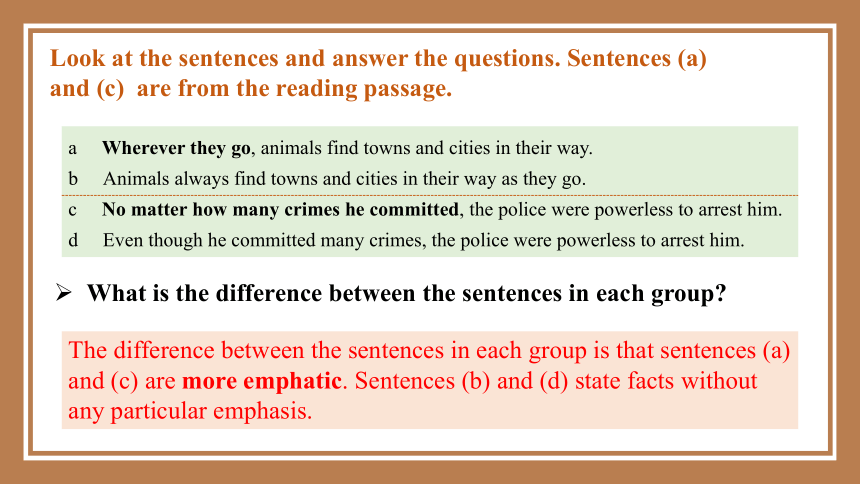
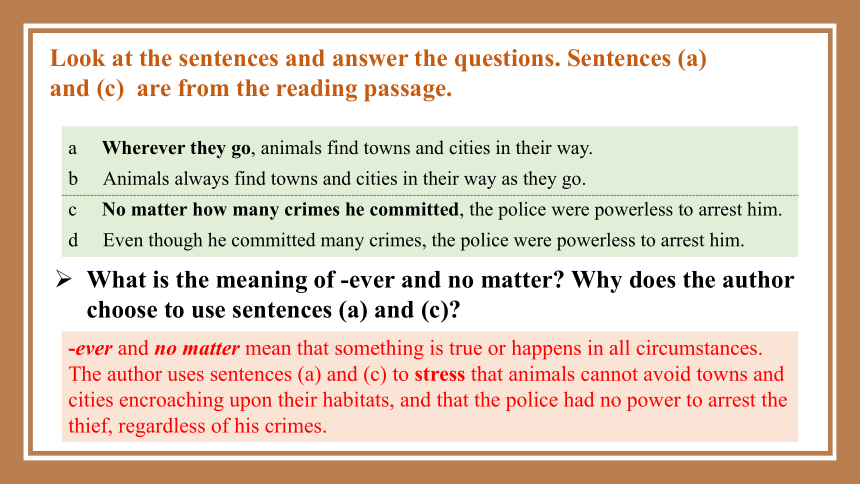
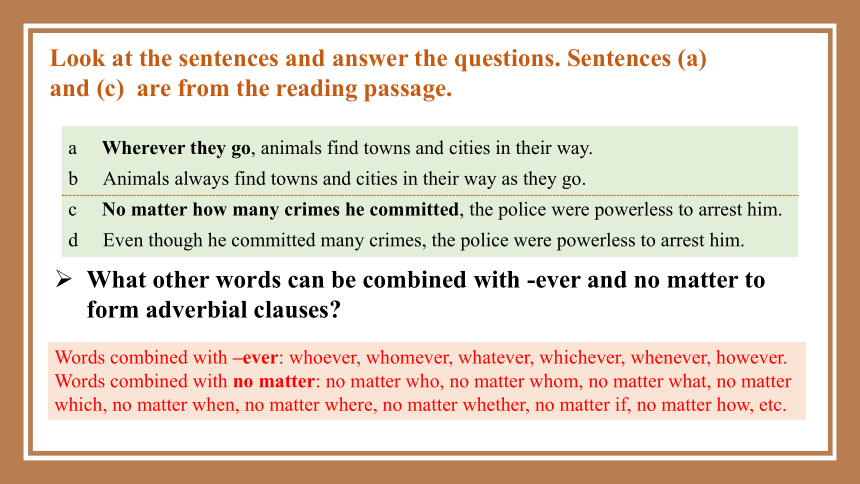
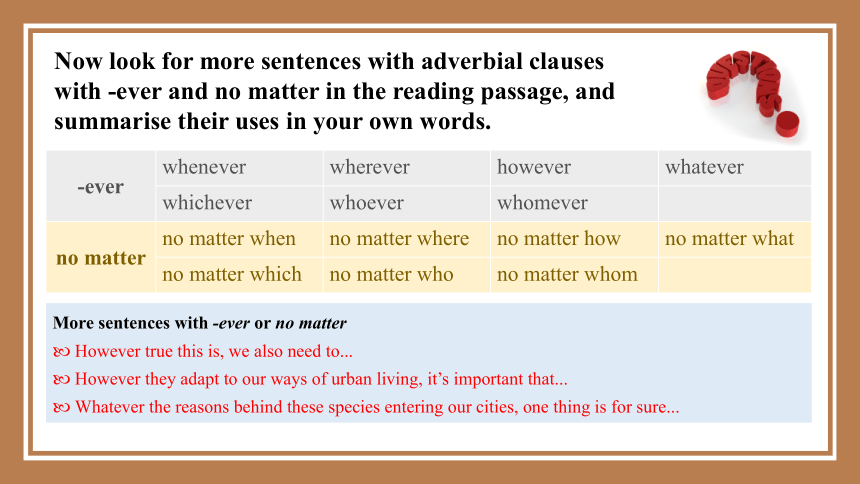

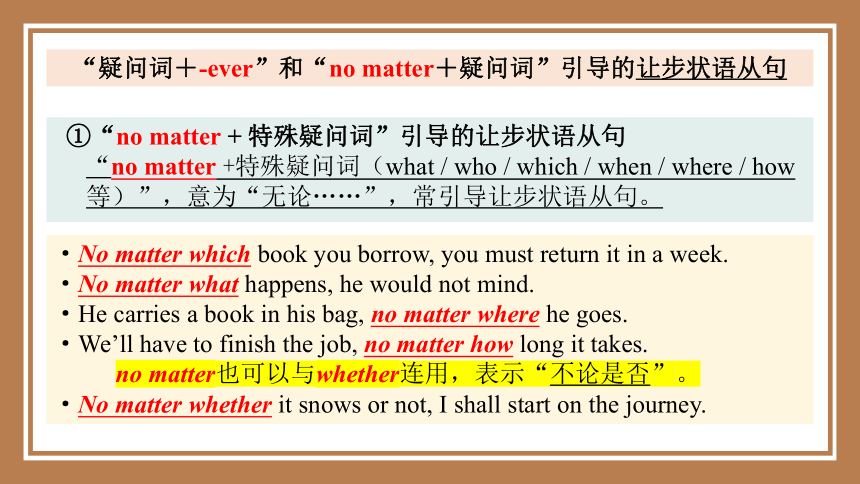


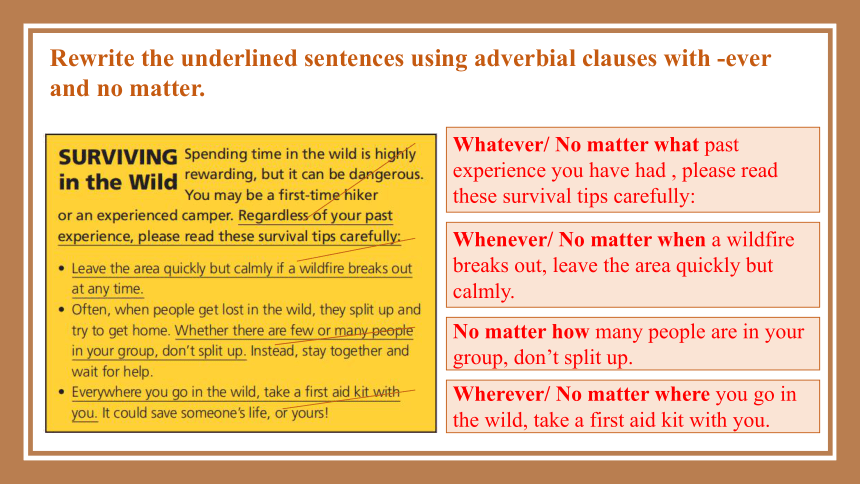
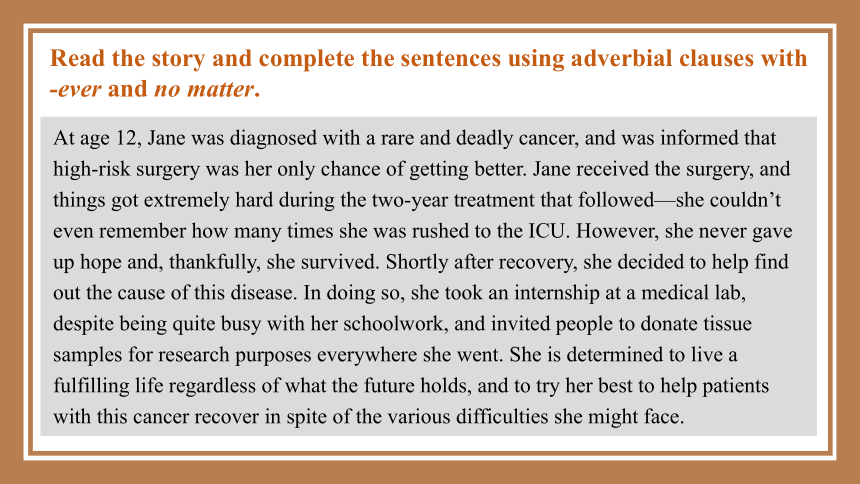
文档简介
(共30张PPT)
Unit 6
Survival
Using language
Adverbial clauses with -ever and no matter
BY MICHELLE
Grammar
01
Look at the sentences and answer the questions. Sentences (a)
and (c) are from the reading passage.
What is the difference between the sentences in each group
The difference between the sentences in each group is that sentences (a) and (c) are more emphatic. Sentences (b) and (d) state facts without any particular emphasis.
a Wherever they go, animals find towns and cities in their way.
b Animals always find towns and cities in their way as they go.
c No matter how many crimes he committed, the police were powerless to arrest him.
d Even though he committed many crimes, the police were powerless to arrest him.
Look at the sentences and answer the questions. Sentences (a)
and (c) are from the reading passage.
What is the meaning of -ever and no matter Why does the author choose to use sentences (a) and (c)
-ever and no matter mean that something is true or happens in all circumstances. The author uses sentences (a) and (c) to stress that animals cannot avoid towns and cities encroaching upon their habitats, and that the police had no power to arrest the thief, regardless of his crimes.
a Wherever they go, animals find towns and cities in their way.
b Animals always find towns and cities in their way as they go.
c No matter how many crimes he committed, the police were powerless to arrest him.
d Even though he committed many crimes, the police were powerless to arrest him.
Look at the sentences and answer the questions. Sentences (a)
and (c) are from the reading passage.
What other words can be combined with -ever and no matter to form adverbial clauses
Words combined with –ever: whoever, whomever, whatever, whichever, whenever, however.
Words combined with no matter: no matter who, no matter whom, no matter what, no matter which, no matter when, no matter where, no matter whether, no matter if, no matter how, etc.
a Wherever they go, animals find towns and cities in their way.
b Animals always find towns and cities in their way as they go.
c No matter how many crimes he committed, the police were powerless to arrest him.
d Even though he committed many crimes, the police were powerless to arrest him.
Now look for more sentences with adverbial clauses with -ever and no matter in the reading passage, and summarise their uses in your own words.
-ever whenever wherever however whatever
whichever whoever whomever
no matter no matter when no matter where no matter how no matter what
no matter which no matter who no matter whom
More sentences with -ever or no matter
However true this is, we also need to...
However they adapt to our ways of urban living, it’s important that...
Whatever the reasons behind these species entering our cities, one thing is for sure...
让步状语从句
让步状语从句由 although,though,as,even if,even though,while,whether...or(not),“疑问词 + -ever”,“no matter + 疑问词”等引导。
although,though,even if/even though 都作“虽然,尽管”讲。Even if/even though 所表示的让步语气最强,although 次之,though 最弱。
He will never tell you the truth even if he knows it.
Although everyone played well,we lost the game.
The old woman is unhappy though she has a lot of money.
whenever,wherever,however,whatever,whoever 以 及“no matter + when/where/how/ what/ who” 等都可以引导让步状语从句,意义无差异。
·No matter which book you borrow, you must return it in a week.
·No matter what happens, he would not mind.
·He carries a book in his bag, no matter where he goes.
·We’ll have to finish the job, no matter how long it takes.
no matter也可以与whether连用,表示“不论是否”。
·No matter whether it snows or not, I shall start on the journey.
①“no matter + 特殊疑问词”引导的让步状语从句
“no matter +特殊疑问词(what / who / which / when / where / how等)”,意为“无论……”,常引导让步状语从句。
“疑问词+-ever”和“no matter+疑问词”引导的让步状语从句
·Whenever (=No matter when) you come back, don’t wake me up.
·Wherever (=No matter where) he is, he makes it a rule to give his mother a call every day.
·However (=No matter how) carefully I explained, she still didn’t understand.
·Whatever (=No matter what) you’re looking for, color is the key to making a room feel the way you want it to feel.
②“特殊疑问词+ -ever”引导的让步状语从句
在英语中,“特殊疑问词+-ever”引导让步状语从句,意为“无论……”,可与“no matter+特殊疑问词”相互替换。
“疑问词+-ever”和“no matter+疑问词”引导的让步状语从句
·Whatever arouses his interest can be found in the school library.
(Whatever引导主语从句)
·Eat either cake you like and leave the other for whoever comes late.
(whoever引导宾语从句)
·You can take whichever seat you like.
(whichever引导宾语从句)
③“特殊疑问词+-ever”不可与“no matter+特殊疑问词”互换的情形
whatever,whoever和whichever除了引导让步状语从句外,还可引导名词性从句,此时不可与no matter what,no matter who和no matter which互换。
“疑问词+-ever”和“no matter+疑问词”引导的让步状语从句
Rewrite the underlined sentences using adverbial clauses with -ever and no matter.
Whatever/ No matter what past experience you have had , please read these survival tips carefully:
Whenever/ No matter when a wildfire breaks out, leave the area quickly but calmly.
No matter how many people are in your group, don’t split up.
Wherever/ No matter where you go in the wild, take a first aid kit with you.
Read the story and complete the sentences using adverbial clauses with -ever and no matter.
At age 12, Jane was diagnosed with a rare and deadly cancer, and was informed that high-risk surgery was her only chance of getting better. Jane received the surgery, and things got extremely hard during the two-year treatment that followed—she couldn’t even remember how many times she was rushed to the ICU. However, she never gave up hope and, thankfully, she survived. Shortly after recovery, she decided to help find out the cause of this disease. In doing so, she took an internship at a medical lab, despite being quite busy with her schoolwork, and invited people to donate tissue samples for research purposes everywhere she went. She is determined to live a fulfilling life regardless of what the future holds, and to try her best to help patients with this cancer recover in spite of the various difficulties she might face.
1 (how), Jane never gave up hope.
2 (where), Jane would invite people to donate tissue samples for research purposes.
3 Jane is determined to live a fulfilling life
(what).
4 (what), Jane is determined to help patients recover from this cancer.
No matter how hard / However hard the things were
No matter where / Wherever she went
no matter what / whatever the future holds
No matter what / Whatever difficulties she might face
Think of another survival story and tell the class about it using adverbial clauses with -ever and no matter. Do online research if necessary.
Listening & speaking
02
Facing crisis
Do You Know There is a very exciting book called The Adventures of Robinson Crusoe, whose theme is about survival. Have you read it before Can you remember some stories in that book
Listen to the conversation and choose the ideas NOT conveyed by the speakers.
1 The story of Robinson Crusoe is a very sad survival story.
2 It takes great patience for Robinson Crusoe to survive on the island.
3 Robinson Crusoe is a clever and optimistic man.
4 Robinson Crusoe’s words are good suggestions when we are faced with a crisis.
5 The most important reason for Robinson Crusoe’s survival is his calmness.
Listen again and complete the diagram.
1 lose his head 2 gets necessary things
3 lives in a cave 4 builds a fence
5 makes a fire 6 out of wood
7 sewing animal skins together
8 knowledgeable
9 widen and deepen his cave
10 ruined by a landslide/ruined by a fall of earth
11 feel depressed
12 redoes the work, using wooden posts to make the cave stronger than before
13 looks more upon the bright side of his condition, and less upon the dark side
14 positive attitude
Discussion
Now talk about the qualities that help Robinson Crusoe to survive. Do further research if necessary.
the qualities that help Robinson to survive:
calmness
being wise and knowledgeable
patience and perseverance
positive attitude
Sentence patterns that may help you:
It is important / necessary / vital to stay calm, for …
Being wise and knowledgeable is extremely significant, because …
Complete the boxes with the expressions from the conversation.
Asking for opinions
Giving opinions
Agreeing
What do you think...
What’s your take on this
The way I see it, ...
Personally, I think/believe...
I’m quite impressed...
What surprises me more is...
I can’t agree more.
I think you are right.
I think so, too.
That’s true.
Read the passage and answer the questions.
What kinds of crises do you know people are facing in different parts of the world
What can we do when facing such crises
The ecological crisis, the threat of nuclear war, lack of resource, terrorism, the gap between the rich and the poor.
In the face of these crises, we can no longer fight alone. The people of the world should unite and face these crises together.
Vocabulary building
03
Background Information
Crises the world faces
Not only should a single person know how to survive in crises, but also this world has to take measures to cope with the crises it faces. What are the crises this world faces
Read the newspaper reports and answer the questions. Pay attention to
the words and expressions in bold.
What situations are mentioned in the headlines
The first one tells of an outbreak of a new disease.
The second one reports a heat wave.
The third one tells of an oil shortage.
The fourth one reports the invasion of foreign species on an island.
The fifth one tells of the spreading of a huge fire.
disease
climate issue
energy shortage
ecological crisis
natural disaster
How do people and organisations react to these crises
Doctors are flying there and will be testing various medicines to find a cure.
Countries which are hit by a heat wave advise people to stay indoors and avoid exercise. Some people go to swimming pools and beaches to cool themselves down.
The President has announced measures to limit fuel consumption and scientists are finding new measures and fuel sources.
Scientists are carrying out a three year programme to eliminate the introduced species.
Firefighters brought the huge fire under control after battling for hours.
Read the advertisement and rewrite the underlined expressions with the correct form of the words and expressions in Activity 9.
battle struggle with cope with eliminate bring… under control
SURVIVOR is a new monthly magazine for people interested in ecosystem and disaster management. Each issue looks at some of the most urgent problems of our time. Our first issue has a special focus on 1fighting against global warming. Temperatures are rising, and nations are failing to 2respond to it. As islands 3wrestle with rising sea levels, what is to be done Plus, it also includes a free poster illustrating new plans to 4get rid of the Ebola virus once and for all. We invite you to read Survivor and learn how we might 5stop our problems from getting worse!
battling
cope with
struggle with
bring our problems under control
eliminate
A: How do you think people should react to...
B: I think people should keep/stay/be...
A: Yes, but apart from that, I believe it is more important for people to...
B: But what if.../what about...
A: In that case, perhaps we could...
Work in pairs. Think of another issue concerning survival and talk about how to deal with it. Use the words and expressions in this section.
Adverbial clauses with -ever and no matter.
Think of another issue concerning survival and talk about how to deal with it. Use the words and expressions in this section. Talk with your friends.
THANKS FOR WATCHING
Unit 6
Survival
Using language
Adverbial clauses with -ever and no matter
BY MICHELLE
Grammar
01
Look at the sentences and answer the questions. Sentences (a)
and (c) are from the reading passage.
What is the difference between the sentences in each group
The difference between the sentences in each group is that sentences (a) and (c) are more emphatic. Sentences (b) and (d) state facts without any particular emphasis.
a Wherever they go, animals find towns and cities in their way.
b Animals always find towns and cities in their way as they go.
c No matter how many crimes he committed, the police were powerless to arrest him.
d Even though he committed many crimes, the police were powerless to arrest him.
Look at the sentences and answer the questions. Sentences (a)
and (c) are from the reading passage.
What is the meaning of -ever and no matter Why does the author choose to use sentences (a) and (c)
-ever and no matter mean that something is true or happens in all circumstances. The author uses sentences (a) and (c) to stress that animals cannot avoid towns and cities encroaching upon their habitats, and that the police had no power to arrest the thief, regardless of his crimes.
a Wherever they go, animals find towns and cities in their way.
b Animals always find towns and cities in their way as they go.
c No matter how many crimes he committed, the police were powerless to arrest him.
d Even though he committed many crimes, the police were powerless to arrest him.
Look at the sentences and answer the questions. Sentences (a)
and (c) are from the reading passage.
What other words can be combined with -ever and no matter to form adverbial clauses
Words combined with –ever: whoever, whomever, whatever, whichever, whenever, however.
Words combined with no matter: no matter who, no matter whom, no matter what, no matter which, no matter when, no matter where, no matter whether, no matter if, no matter how, etc.
a Wherever they go, animals find towns and cities in their way.
b Animals always find towns and cities in their way as they go.
c No matter how many crimes he committed, the police were powerless to arrest him.
d Even though he committed many crimes, the police were powerless to arrest him.
Now look for more sentences with adverbial clauses with -ever and no matter in the reading passage, and summarise their uses in your own words.
-ever whenever wherever however whatever
whichever whoever whomever
no matter no matter when no matter where no matter how no matter what
no matter which no matter who no matter whom
More sentences with -ever or no matter
However true this is, we also need to...
However they adapt to our ways of urban living, it’s important that...
Whatever the reasons behind these species entering our cities, one thing is for sure...
让步状语从句
让步状语从句由 although,though,as,even if,even though,while,whether...or(not),“疑问词 + -ever”,“no matter + 疑问词”等引导。
although,though,even if/even though 都作“虽然,尽管”讲。Even if/even though 所表示的让步语气最强,although 次之,though 最弱。
He will never tell you the truth even if he knows it.
Although everyone played well,we lost the game.
The old woman is unhappy though she has a lot of money.
whenever,wherever,however,whatever,whoever 以 及“no matter + when/where/how/ what/ who” 等都可以引导让步状语从句,意义无差异。
·No matter which book you borrow, you must return it in a week.
·No matter what happens, he would not mind.
·He carries a book in his bag, no matter where he goes.
·We’ll have to finish the job, no matter how long it takes.
no matter也可以与whether连用,表示“不论是否”。
·No matter whether it snows or not, I shall start on the journey.
①“no matter + 特殊疑问词”引导的让步状语从句
“no matter +特殊疑问词(what / who / which / when / where / how等)”,意为“无论……”,常引导让步状语从句。
“疑问词+-ever”和“no matter+疑问词”引导的让步状语从句
·Whenever (=No matter when) you come back, don’t wake me up.
·Wherever (=No matter where) he is, he makes it a rule to give his mother a call every day.
·However (=No matter how) carefully I explained, she still didn’t understand.
·Whatever (=No matter what) you’re looking for, color is the key to making a room feel the way you want it to feel.
②“特殊疑问词+ -ever”引导的让步状语从句
在英语中,“特殊疑问词+-ever”引导让步状语从句,意为“无论……”,可与“no matter+特殊疑问词”相互替换。
“疑问词+-ever”和“no matter+疑问词”引导的让步状语从句
·Whatever arouses his interest can be found in the school library.
(Whatever引导主语从句)
·Eat either cake you like and leave the other for whoever comes late.
(whoever引导宾语从句)
·You can take whichever seat you like.
(whichever引导宾语从句)
③“特殊疑问词+-ever”不可与“no matter+特殊疑问词”互换的情形
whatever,whoever和whichever除了引导让步状语从句外,还可引导名词性从句,此时不可与no matter what,no matter who和no matter which互换。
“疑问词+-ever”和“no matter+疑问词”引导的让步状语从句
Rewrite the underlined sentences using adverbial clauses with -ever and no matter.
Whatever/ No matter what past experience you have had , please read these survival tips carefully:
Whenever/ No matter when a wildfire breaks out, leave the area quickly but calmly.
No matter how many people are in your group, don’t split up.
Wherever/ No matter where you go in the wild, take a first aid kit with you.
Read the story and complete the sentences using adverbial clauses with -ever and no matter.
At age 12, Jane was diagnosed with a rare and deadly cancer, and was informed that high-risk surgery was her only chance of getting better. Jane received the surgery, and things got extremely hard during the two-year treatment that followed—she couldn’t even remember how many times she was rushed to the ICU. However, she never gave up hope and, thankfully, she survived. Shortly after recovery, she decided to help find out the cause of this disease. In doing so, she took an internship at a medical lab, despite being quite busy with her schoolwork, and invited people to donate tissue samples for research purposes everywhere she went. She is determined to live a fulfilling life regardless of what the future holds, and to try her best to help patients with this cancer recover in spite of the various difficulties she might face.
1 (how), Jane never gave up hope.
2 (where), Jane would invite people to donate tissue samples for research purposes.
3 Jane is determined to live a fulfilling life
(what).
4 (what), Jane is determined to help patients recover from this cancer.
No matter how hard / However hard the things were
No matter where / Wherever she went
no matter what / whatever the future holds
No matter what / Whatever difficulties she might face
Think of another survival story and tell the class about it using adverbial clauses with -ever and no matter. Do online research if necessary.
Listening & speaking
02
Facing crisis
Do You Know There is a very exciting book called The Adventures of Robinson Crusoe, whose theme is about survival. Have you read it before Can you remember some stories in that book
Listen to the conversation and choose the ideas NOT conveyed by the speakers.
1 The story of Robinson Crusoe is a very sad survival story.
2 It takes great patience for Robinson Crusoe to survive on the island.
3 Robinson Crusoe is a clever and optimistic man.
4 Robinson Crusoe’s words are good suggestions when we are faced with a crisis.
5 The most important reason for Robinson Crusoe’s survival is his calmness.
Listen again and complete the diagram.
1 lose his head 2 gets necessary things
3 lives in a cave 4 builds a fence
5 makes a fire 6 out of wood
7 sewing animal skins together
8 knowledgeable
9 widen and deepen his cave
10 ruined by a landslide/ruined by a fall of earth
11 feel depressed
12 redoes the work, using wooden posts to make the cave stronger than before
13 looks more upon the bright side of his condition, and less upon the dark side
14 positive attitude
Discussion
Now talk about the qualities that help Robinson Crusoe to survive. Do further research if necessary.
the qualities that help Robinson to survive:
calmness
being wise and knowledgeable
patience and perseverance
positive attitude
Sentence patterns that may help you:
It is important / necessary / vital to stay calm, for …
Being wise and knowledgeable is extremely significant, because …
Complete the boxes with the expressions from the conversation.
Asking for opinions
Giving opinions
Agreeing
What do you think...
What’s your take on this
The way I see it, ...
Personally, I think/believe...
I’m quite impressed...
What surprises me more is...
I can’t agree more.
I think you are right.
I think so, too.
That’s true.
Read the passage and answer the questions.
What kinds of crises do you know people are facing in different parts of the world
What can we do when facing such crises
The ecological crisis, the threat of nuclear war, lack of resource, terrorism, the gap between the rich and the poor.
In the face of these crises, we can no longer fight alone. The people of the world should unite and face these crises together.
Vocabulary building
03
Background Information
Crises the world faces
Not only should a single person know how to survive in crises, but also this world has to take measures to cope with the crises it faces. What are the crises this world faces
Read the newspaper reports and answer the questions. Pay attention to
the words and expressions in bold.
What situations are mentioned in the headlines
The first one tells of an outbreak of a new disease.
The second one reports a heat wave.
The third one tells of an oil shortage.
The fourth one reports the invasion of foreign species on an island.
The fifth one tells of the spreading of a huge fire.
disease
climate issue
energy shortage
ecological crisis
natural disaster
How do people and organisations react to these crises
Doctors are flying there and will be testing various medicines to find a cure.
Countries which are hit by a heat wave advise people to stay indoors and avoid exercise. Some people go to swimming pools and beaches to cool themselves down.
The President has announced measures to limit fuel consumption and scientists are finding new measures and fuel sources.
Scientists are carrying out a three year programme to eliminate the introduced species.
Firefighters brought the huge fire under control after battling for hours.
Read the advertisement and rewrite the underlined expressions with the correct form of the words and expressions in Activity 9.
battle struggle with cope with eliminate bring… under control
SURVIVOR is a new monthly magazine for people interested in ecosystem and disaster management. Each issue looks at some of the most urgent problems of our time. Our first issue has a special focus on 1fighting against global warming. Temperatures are rising, and nations are failing to 2respond to it. As islands 3wrestle with rising sea levels, what is to be done Plus, it also includes a free poster illustrating new plans to 4get rid of the Ebola virus once and for all. We invite you to read Survivor and learn how we might 5stop our problems from getting worse!
battling
cope with
struggle with
bring our problems under control
eliminate
A: How do you think people should react to...
B: I think people should keep/stay/be...
A: Yes, but apart from that, I believe it is more important for people to...
B: But what if.../what about...
A: In that case, perhaps we could...
Work in pairs. Think of another issue concerning survival and talk about how to deal with it. Use the words and expressions in this section.
Adverbial clauses with -ever and no matter.
Think of another issue concerning survival and talk about how to deal with it. Use the words and expressions in this section. Talk with your friends.
THANKS FOR WATCHING
